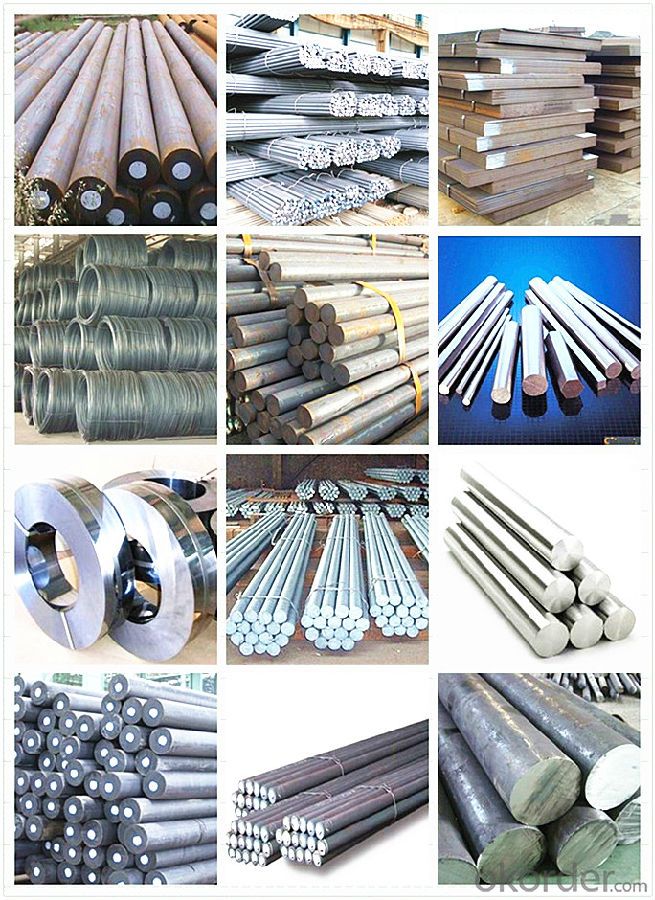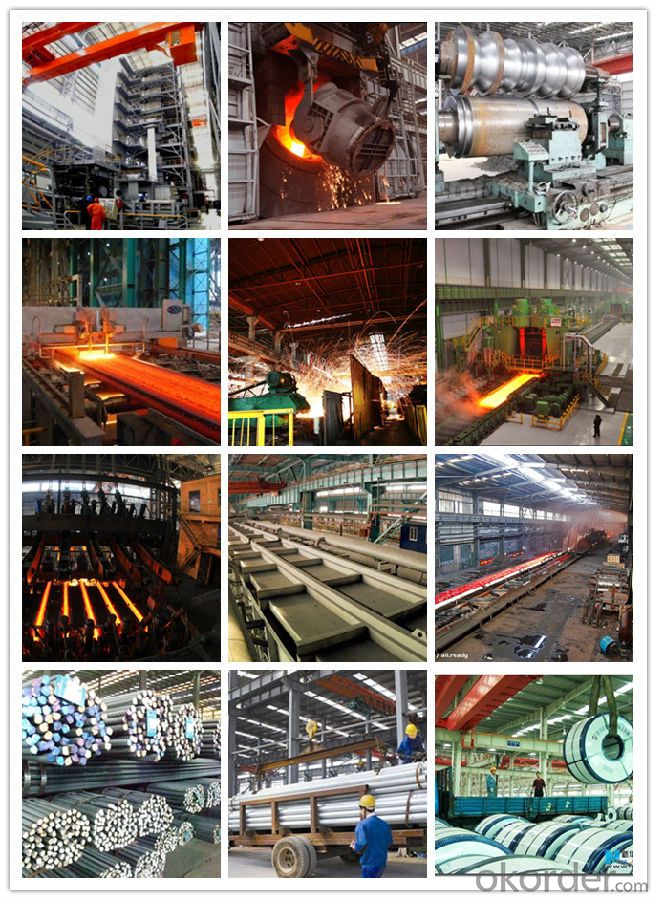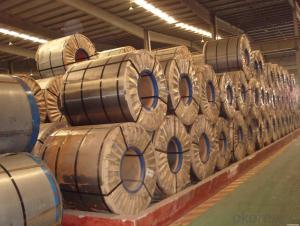Alloy Steel 8mm SAE 1010 Coils Steel Wire Rod
- Loading Port:
- China main port
- Payment Terms:
- TT OR LC
- Min Order Qty:
- 30 m.t.
- Supply Capability:
- 10000 m.t./month
OKorder Service Pledge
OKorder Financial Service
You Might Also Like
Item specifice
Product information:
Secifications
8mm SAE 1010b Coils Steel Wire Rod
other name: 5.5mm-12mm wire rod in coil
1.Grade: SAE 1006B,SAE 1008B,AISI 1050, AISI 1070
2.Diameter: 5.5mm-12mm
sae 1008 steel wire rod
Product | sae 1008 low carbon steel wire rod price steel wire rod carbon steel wire rod |
Standard | AISI, SAE,ASTM, BS, DIN, GB, JIS |
Steel grade | Q195,Q235,SAE1006B, SAE1008B, SAE1010B, SAE1018B, AISI 1010, AISI 1020, AISI 1050, AISI 1070 or according to customers requirements |
Material | Mild steel, iron, carbon, steel, ms |
Wire Gauge | 5.5mm,6.5mm,8mm,10mm,12mm-18mm, |
Technique | Hot rolled, Cold Drawn |
Coil weight | 1.8-2.1mts |
MOQ | 10MT |
Delivery Time | 15-30 days after receipt of L/C or deposit by T/T |
Packing | In coil and load in container, if large quantity, by bulk vessel; Can be packed as customers' special requirements |
Payment terms | 1).100% irrevocable L/C at sight. |
Application | widely used in machinery parts, manufacturing industry, electronics industry, metal tools and others |
Product Show:

Workshop Show:

Shipping
1. FedEx/DHL/UPS/TNT for samples, Door-to-Door;
2. By Air or by Sea for batch goods, for FCL; Airport/ Port receiving;
3. Customers specifying freight forwarders or negotiable shipping methods!
Delivery Time: 3-7 days for samples; 5-25 days for batch goods.
Payment Terms
1.Payment: T/T, L/C, Western Union, MoneyGram,PayPal; 30% deposits; 70% balance before delivery.
2.MOQ: 1pcs
3.Warranty : 3 years
4.Package Informations: 1) EXPORT, In 20 feet (GW 25 ton) or 40 feet Container (GW 25 ton)
2)as customer's requirement
Why choose us?
(1) The leading exporter in China special steel industry.
(2) Large stocks for various sizes, fast delivery date.
(3) Good business relationship with China famous factories.
(4) More than 7 years steel exporting experience.
(5) Good after-sales service guarantee.
- Q:What are the applications of special steel in the nuclear supply chain?
- Special steel has numerous applications in the nuclear supply chain. It is used in the construction of nuclear reactors, where it provides the necessary strength and resistance to extreme temperatures and pressures. Special steel is also utilized in the manufacturing of fuel rods, containment vessels, and other critical components that require high durability and corrosion resistance. Additionally, special steel is employed in the production of storage containers for nuclear waste and in the construction of transportation casks for the safe transport of radioactive materials.
- Q:How does special steel contribute to the medical industry?
- Special steel plays a crucial role in the medical industry by offering a range of desirable properties such as high strength, corrosion resistance, and biocompatibility. It is extensively utilized in the manufacturing of medical devices and surgical instruments, ensuring their durability, precision, and sterility. From implants and prosthetics to surgical tools and equipment, special steel enables advancements in medical treatments, enhancing patient outcomes and improving overall healthcare.
- Q:How is special steel classified?
- Special steel is classified based on its chemical composition, manufacturing process, and specific properties. It can be categorized into various types such as stainless steel, tool steel, alloy steel, and high-speed steel, each having distinct characteristics that make them suitable for specific applications.
- Q:How does special steel contribute to the manufacturing of cutting tools?
- Special steel plays a crucial role in the manufacturing of cutting tools due to its unique properties and characteristics. Firstly, special steel, also known as tool steel, exhibits high hardness, which allows it to withstand the tremendous forces and stress exerted during cutting operations. This hardness prevents the cutting tools from deforming or wearing out quickly, ensuring their longevity and efficiency. Additionally, special steel possesses excellent wear resistance. Cutting tools are subjected to constant friction and abrasion while in use, and the high wear resistance of special steel helps to minimize the wear and tear on the tools. This, in turn, leads to improved tool life, reducing the frequency of tool replacements and enhancing cost-effectiveness in the manufacturing process. Furthermore, special steel offers superior heat resistance. Cutting tools generate significant heat during machining operations, which can lead to thermal degradation and loss of hardness in conventional steels. However, special steel can withstand high temperatures without compromising its hardness and integrity. This heat resistance allows cutting tools to maintain their performance even under extreme heat conditions, ensuring consistent and precise cutting results. Moreover, the special steel used in cutting tool manufacturing often exhibits excellent toughness and strength. This enables the tools to endure heavy loads and impacts without fracturing or chipping. The combination of hardness, wear resistance, heat resistance, toughness, and strength provided by special steel ensures the durability and reliability of cutting tools, allowing them to perform efficiently and accurately. Overall, special steel significantly contributes to the manufacturing of cutting tools by providing the necessary properties to withstand the demanding conditions encountered during cutting operations. Its high hardness, wear resistance, heat resistance, toughness, and strength ensure that cutting tools remain sharp, durable, and efficient, thereby enhancing productivity and precision in various industries, such as automotive, aerospace, and manufacturing.
- Q:How does special steel contribute to the defense industry?
- Special steel contributes to the defense industry in various ways. Its exceptional strength, durability, and resistance to corrosion make it an ideal material for manufacturing military equipment, such as tanks, submarines, and aircraft carriers. Special steel is also used in the production of firearms, missiles, and armored vehicles, providing enhanced protection and performance capabilities. Additionally, its heat resistance and ability to withstand extreme temperatures make it suitable for crafting jet engines and other critical components used in military aircraft. Overall, special steel plays a crucial role in ensuring the reliability, safety, and effectiveness of defense equipment.
- Q:What are the different methods for joining special steel components?
- There are several methods for joining special steel components, each with its own advantages and limitations. Some of the common methods include: 1. Welding: This is one of the most widely used methods for joining steel components. It involves melting the edges of the components and fusing them together. Welding can be done using various techniques such as arc welding, gas welding, or laser welding, depending on the specific requirements of the project. 2. Bolting: Bolting involves using bolts, nuts, and washers to join steel components together. This method is preferred for applications where disassembly or maintenance may be required. It provides a strong and reliable connection but may not be suitable for high-stress applications. 3. Riveting: Riveting involves using metal fasteners called rivets to join steel components together. This method is commonly used in applications where high strength and resistance to vibration are required. Riveting is a permanent joining method that provides a strong and durable connection. 4. Adhesive bonding: Adhesive bonding involves using high-strength adhesives to join steel components together. This method is preferred for applications where aesthetics and weight reduction are important. Adhesive bonding can provide a strong and durable connection, but the surface preparation and adhesive selection are critical for ensuring the bond's strength. 5. Mechanical fastening: Mechanical fastening methods, such as using screws or clips, can also be used to join special steel components. This method is often used for temporary connections or for components that need to be easily assembled and disassembled. Each joining method has its own advantages and considerations, and the choice of method depends on factors such as the specific application, load requirements, lifespan expectations, cost considerations, and the nature of the steel components being joined. It is important to carefully evaluate these factors and consult with experts to determine the most suitable joining method for a given project.
- Q:How does special steel contribute to weight reduction in manufacturing?
- Special steel is a type of steel that has been specifically engineered to possess certain characteristics that make it suitable for various applications in manufacturing. One of the key advantages of special steel is its ability to contribute to weight reduction in manufacturing processes. Special steel is often utilized in industries where weight reduction is crucial, such as automotive, aerospace, and construction. This is because special steel possesses a high strength-to-weight ratio, meaning it can provide the required strength and performance while being lighter in weight compared to other materials. By using special steel in manufacturing processes, companies can achieve weight reduction in several ways. Firstly, the lightweight nature of special steel allows for the production of components and structures that are significantly lighter than those made from conventional steel or other materials. This reduction in weight can have numerous benefits, including improved fuel efficiency in automobiles, increased payload capacity in aircraft, and easier handling and installation in construction projects. Additionally, special steel's high strength-to-weight ratio enables manufacturers to design and produce thinner, yet equally strong, components. This not only reduces the overall weight of the manufactured product but also allows for more efficient use of materials, leading to cost savings and a more sustainable manufacturing process. Furthermore, special steel's unique properties, such as its excellent formability and weldability, enable manufacturers to create complex and intricate designs that can further contribute to weight reduction. This versatility allows for the production of lightweight components with intricate shapes and structures, which can enhance overall performance and functionality. In summary, special steel plays a crucial role in weight reduction in manufacturing processes. Its high strength-to-weight ratio, lightweight nature, excellent formability, and weldability enable the production of lighter components and structures. By utilizing special steel, industries can achieve improved efficiency, performance, and sustainability in their manufacturing operations.
- Q:How does alloy steel improve the strength and toughness of steel?
- Alloy steel improves the strength and toughness of steel by adding specific elements, such as manganese, chromium, nickel, or molybdenum, to the base iron. These alloying elements create atomic interactions within the steel matrix that enhance its properties. They help to refine the grain structure, increase hardenability, and improve resistance to wear, corrosion, and fatigue. By modifying the composition, alloy steel can achieve a balanced combination of strength, toughness, and other desirable characteristics, making it more suitable for various applications.
- Q:How does special steel contribute to the chemical resistance of products?
- Special steel contributes to the chemical resistance of products by offering enhanced corrosion resistance properties due to its unique composition and manufacturing process. It contains alloying elements such as chromium and nickel, which form a protective oxide layer on the surface that prevents the steel from reacting with corrosive substances. This makes special steel highly resistant to acids, alkalis, and other chemicals, ensuring the longevity and reliability of products in various industries.
- Q:How is special steel used in the manufacturing of bearings?
- Due to its unique properties, special steel is utilized in the production of bearings, which are vital components employed in various industries. These bearings serve the purpose of reducing friction between moving parts, promoting smooth motion, and supporting heavy loads. The utilization of special steel guarantees exceptional performance and longevity. For the production of bearings, the preferred choice of special steel includes stainless steel and high-carbon chromium steel. This selection is based on the remarkable strength, hardness, and resistance to corrosion that these types of steel possess. These properties enable the bearings to endure heavy loads, withstand wear and tear, and operate effectively in challenging environments. The manufacturing process for bearings involves shaping and heat treatment. Initially, special steel is melted and cast into the desired form, typically a ring or a ball. Subsequently, the steel undergoes various heat treatment procedures like annealing, quenching, and tempering to enhance its hardness, toughness, and overall mechanical properties. This heat treatment ensures that the steel is adequately hardened to endure the stress and friction it will encounter during operation. Once the steel has undergone appropriate heat treatment, it is machined and ground to attain precise dimensions and smooth surfaces. This step is vital to ensure that the bearings possess the necessary tolerance and can rotate smoothly without any interference. Special steel's machinability and grindability simplify the achievement of the required accuracy and surface finish. Following the machining process, the bearings can be assembled with other components and lubricated to ensure proper lubrication and minimize friction. Special steel's corrosion resistance is particularly valuable at this stage as it shields the bearings from rust and degradation caused by moisture or aggressive environments. In conclusion, special steel is chosen for the production of bearings due to its exceptional strength, hardness, and corrosion resistance. These properties enable the bearings to withstand heavy loads, resist wear, and function effectively in challenging conditions. With the aid of its excellent machinability and grindability, special steel guarantees the attainment of the necessary precision and surface finish. Overall, special steel plays a pivotal role in the production of high-quality bearings that enable efficient and reliable motion in various industries.
1. Manufacturer Overview |
|
|---|---|
| Location | |
| Year Established | |
| Annual Output Value | |
| Main Markets | |
| Company Certifications | |
2. Manufacturer Certificates |
|
|---|---|
| a) Certification Name | |
| Range | |
| Reference | |
| Validity Period | |
3. Manufacturer Capability |
|
|---|---|
| a)Trade Capacity | |
| Nearest Port | |
| Export Percentage | |
| No.of Employees in Trade Department | |
| Language Spoken: | |
| b)Factory Information | |
| Factory Size: | |
| No. of Production Lines | |
| Contract Manufacturing | |
| Product Price Range | |
Send your message to us
Alloy Steel 8mm SAE 1010 Coils Steel Wire Rod
- Loading Port:
- China main port
- Payment Terms:
- TT OR LC
- Min Order Qty:
- 30 m.t.
- Supply Capability:
- 10000 m.t./month
OKorder Service Pledge
OKorder Financial Service
Similar products
New products
Hot products
Related keywords






























